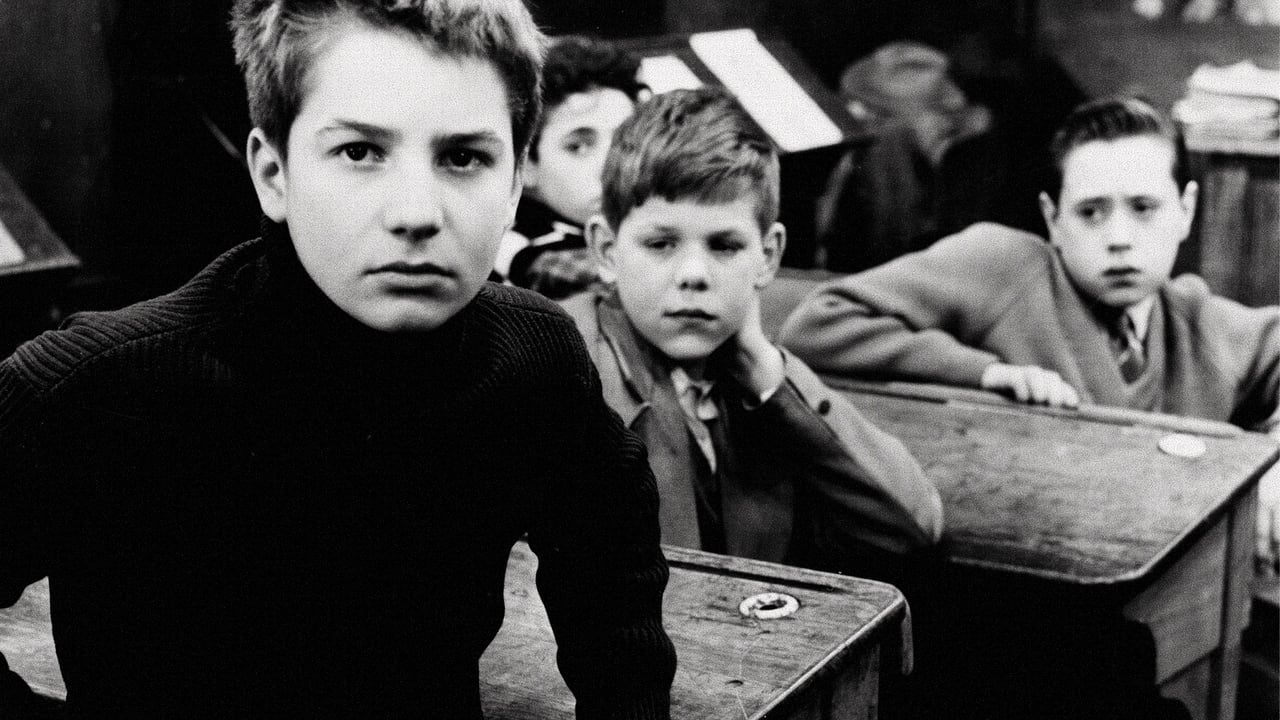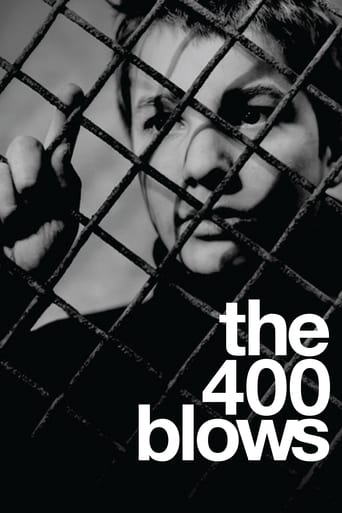

In my youth I have done things that I considered as wrong or unjust because of my upbringing, but films like The 400 Blows, Murmur of the Heart and Call Me By Your Name clarify that the transition to boyhood to manhood and the endless need for exploration is ordinary. Not that living ordinary is a bad thing, it just means that everyone in life has this sense of sonder that may correlate with one another, it is real, it is beautiful, and boys (especially in their teens) do weird things when they're alone.Antoine Doinel is bright and curious but his environment is against him; teachers (Institution) who criticize him without consideration, parents (Family) who are distant like a generational gap, and authorities (Law) that has no care whatsoever to the youth for order. Having a friend like Rene is a blessing because you know they'll be friends for life and they share the same ideals. It is also fun to watch them roam the surroundings for adventure.Antoine isn't necessarily a sympathetic character, he's wild, stubborn, he used an excuse that his mother died for missing a day at school, stealing his grandmother's money just because. Léaud is amazing in this because you sympathize with him. The gazes to nowhere, mannerisms and the improvisations at his age at the time is genius. Raw talent and the realness of his portrayal should be a principle for authenticity in real life or actors who are willing to grasp it.The techniques that Francois Truffaut has done here is a pleasure to experience. The comical scenes with the kid getting ink all over his notebook and the dispersion of the students one by one. These takes are well earned and hilarious. The seamless and clean long takes of Antoine running is an awe and the freeze frames (the mugshot and end frame) is incredibly striking, you get the idea that those frames were directed at the audience.This movie is about freedom, in every sense of it. Antoine never seeing the sea in his life, finally reaching it, and it is a dead end - what's next for him?
... View MoreFrancois Truffaut's "The 400 Blows" was one of the films that set the French New Wave in motion, but whereas many of its peers stand out mostly for their experimentation, "The 400 Blows" offers deeper human truth in addition to innovative filmmaking technique.In a clearly a semi-autobiographical story, the film focuses on a young boy (Jean-Pierre Leaud) in his emerging teens who doesn't care much for school, isn't emotionally well cared for at home and endeavors to live "the wild life" (to use the more accurate translation of the film's title) with help from his friend Rene (Patrick Auffay). The film consists not of a narrative arc, but of a series of episodes lined up like dominoes, where the choices and consequence of one sequence have obvious implications on the next. Whether you were more the delinquent type in school or not, there's an innocence to Antoine Doinel that makes it difficult not to connect with his experience. Skipping school, running away from home, talking back to the teacher, lying to adults - none of these applied to my childhood, but I also didn't grow up with a cheating mother who found me annoying, a mostly spineless father and teachers more interested in discipline than trying to understand any misbehavior. Although Antoine's choices are ultimately his own, there are so many ways his childhood course could have been corrected, rather than the route his parents and teachers chose to correct it. His desire to avoid and run away represents a universal yearning to escape people and systems that fail us. By the end of the film, we recognize that his choice to act on that impulse shows bravery, not a rogue avoidance of a path to redemption.Truffaut does lots of interesting stuff with the camera in this film, but it's that purity of story that makes "The 400 Blows" a classic. He also has this cynical sense of humor that complements the more dramatic notes and harsher truths of the story. We sense Truffaut's own impishness in the way he depicts Antoine's day-to-day exploits and his attitude toward the adults in the film.The desire for freedom almost poetically fits with what Truffaut brings from a filmmaking perspective to his feature debut. From long tracking shots to the visually unforgettable spinning centrifuge carnival ride sequence, the film occasionally takes these moments of respite from the narrative to let us sit with a particular feeling or emotion. Often, there's a humor associated with these moments too. He even tries a few transitions and camera tricks that by today's standards feel dated or cliche, but the spirit remains.Nevertheless, style feels secondary to story in a way that it doesn't with the films released in close proximity to it including Resnais' "Hiroshima Mon Amour" and Godard's "Breathless." Those films touch upon some interesting themes and ideas, but "The 400 Blows" will connect with a wider audience and should resonate for many more decades into the future.~Steven CThanks for reading! Visit Movie Muse Reviews for more
... View MoreTHE 400 BLOWS is a French drama about childhood and growing up under very difficult family and social circumstances. The main protagonist is a boy, who was faced with a lack of understanding by his own family and teachers at school. His French teacher is the embodiment of terror and incomprehension. His mother and stepfather, because of work and irregular life, do not have time for her only son. The boy began to run away from home and deal with petty crimes...The story is incredibly realistic, clear and honest. Deviation from the traditional narrative is more than obvious. Mr. Truffaut has introduced realistic social and family situations. These situations have offered insight into one emotional confusion and painful agony. It is difficult to describe with words. The boy leads an inner struggle, that moves him away from the school and parents. The story contains some of the director's autobiographical moments and intimate experiences from his youth. Because of that, an image of Paris and a musical score are quite sad. Certain critiques of education or perhaps social incompetence is the point of this movie. Jean-Pierre Léaud as Antoine Doinel is a realistic and simple character. The boy, who does not provoke sympathy. A vulnerability and naivety of his character are amazing. His honesty, while a psychiatrist attempts to fathom reasons for his discontent is almost heartbreaking. His support is Patrick Auffay (René Bigey) as his best friend and accomplice in the crime.Claire Maurier as Gilberte Doinel is quite superficial and deceptive character in the role of Antoine's mother. Albert Rémy as Julien Doinel is a confused and unfulfilled Antoine's stepfather. Guy Decomble as Sourpuss He is an indifferent and insensitive teacher.This is a small and very interesting masterpiece. Very important drop in the French New Wave.
... View MoreThe title of the film is The 400 Blows but its actually an expression for 'Raising Hell.'Made in 1959 in a cinema verite style. This is the full screen debut of Francois Truffaut and an example of the French New Wave. It was a critical hit.Jean-Pierre Leaud plays Antoine Doinel, a misunderstood teenager in Paris who constantly gets into trouble at school and an at home. Doinel is based partly on Truffaut himself.Doinel finds school boring, does not get on with his teachers who usually catch him telling lies including an embarrassing one where in a panic he tells that one of his parent has died. At home he is alone a lot as both parents are working. His glamorous mother (Claire Maurier) seems to have little time for him. He gets on better with his father (Albert Remy) who is more playful but as the film progresses, he is actually the step-father and you also learn that his mother is having an affair. Doinel wants love but his step- father seems too weak (he suspects his wife is cheating) his mother too busy but he seems happiest when she does give him attention such as towelling him down after a bath.Doinel and his best friend Rene get into all sorts of scrapes and petty crime. Several times Doinel runs away from home and sleeps rough. He gets caught stealing a typewriter from his stepfather's workplace and comes into the attention of the police, social services and the judiciary. At the end he is sent to a young offender's institute that he also runs away from and onto a beach to what looks like an uncertain future.However Truffaut would re-visit Doinel over the course of his directing career.Watching this film it becomes apparent how much this influenced the British New Wave in the 1960s. So much of this film reminded me of Kes by Ken Loach with its naturalistic acting styles. Just look at the mischievous scene where the sports teacher takes the class for a walk around the streets of Paris and the kids disappear few at a time. Then there is the very naturalistic scene at the Punch & Judy show where the much younger kids are enjoying themselves. The city is a playground but when Doinel is living rough it is also oppressive and scary.Of course as time has gone on the shock value of the out of control adolescent has been lost with newer, more franker films. The French New Wave also had a different way of telling stories in the cinema that someone like me brought up on a diet of junk Hollywood blockbusters might not always appreciate. The film can be a little too wayward and loose.However the final freeze frame of a boy fulfilling his dream of seeing the sea but still alone and lost is regarded as a classic. Apparently this is the first time a film ends in a freeze frame.
... View More